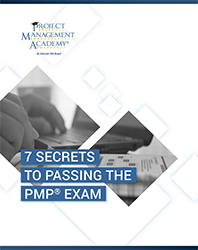
Recently, Project Management Academy® spoke with three of its instructors to discuss their experience in project management, insights into the industry, and advice for aspiring project managers. The second part of this three part series highlights project management tips and advice gleaned from these instructors. If you missed part I, you can view it here. As a refresher, the subjects of the interview are:
- Gregg Richie, PMP, CNP, MCTS; 35 years of experience in construction, project and facilities management with 30 years of in-class instructor experience; author of Wiley Press' Official Microsoft Academic Course book on MS Project
- Jim Stewart, PMP, CSM; 20 years of experience in IT, financial, and pharmaceutical project management roles with 11 years of instructing experience
- Francis Mies, PMP; 18 years of experience in IT and telecommunications project management with over 15 years of instructor experience

7 Secrets to Passing the PMP Exam
Learn the secrets to passing the PMP® exam on your first try.
PMA: What is the very first thing you would do when assigned a project?
JS: I would ask the sponsor to give me all of the technical and business data to read and absorb. I want to know at a very deep level exactly how this project came to be, what decisions were made, how it's technically supposed to work and what its objectives are. I want to hit the ground running and for that, I need to know what the initiators know. And quickly. If they hire me on Friday, by Monday I'll know what they know. You have to be prepared to come in and lead from day one.
GR: After reviewing the documentation regarding the project, I would gather a team of dedicated, professional, high-level subject matter experts. Not necessarily those that would actually be doing the work, but ones who are familiar with that type of project.
FM: For me, that would usually depend on the nature of the project. Technical projects seem to be more straightforward and I would try to get a good handle on what was and was not in scope. Organizational type projects generally carry 'political' considerations. In those cases, I try to determine where the greatest resistance would be.
PMA: Interesting. It seems there's a great deal of work that goes into a project even before its initiation. Tell us, how do you determine realistic schedules for projects?
JS: I determine project schedules the old fashioned way. I try to get realistic estimates from the team members doing the work. If I need three-point estimates, I do that. If I need some buffer for uncertainty, I add that. I don't let the imposed deadline tell me what it takes. I let the project tell me what it takes.
FM: This is usually one of the most challenging aspects of PM activities. Depending on how well I know my team, I may rely on their judgment - an aggregation of activity durations with some room for delay (buffers). Often times I work with a sponsor or consult a mentor.
GR: In my experience, senior management most often takes the first schedule, regardless of how realistic it really is, and they demand that the project be done sooner. This happens in both internal and external projects.
PMA: Very insightful. It's surprising to hear that project scheduling is more of a collaborative effort than the individual responsibility of the project manager. Next, we'd like to know how you prioritize non-sequential tasks.
JS: That's kind of a broad question. But without knowing the actual circumstance, as a generality I'd say if they're non-sequential - and the order doesn't matter - I'll prioritize them based on availability of resources.
FM: Many times this would be dictated by cash flow if we were approaching the end of a quarter. If money was not a factor then I would look to utilize the team members in most demand sooner rather than later.
PMA: Going off that, can you explain your methods for resource allocation?
FM: There really isn't a methodology as such - team members are always over allocated so you have to use them as soon as possible before they are 'commandeered' for another project. Most organizations I've worked for had knee jerk reactions to upper management's whims and thus PMs were constantly scrambling to get work done.
JS: The first thing I do is recognize that this may not entirely be under my control. If I'm working in a matrix environment - and I'm competing for scarce resources - then I have to negotiate with functional managers. Once I understand the resources I have available, I try to allocate the best possible resources to critical path activities because I have the most confidence that they'll keep to their schedule. That said, if I have float in other activities I may have a junior member work on critical path activities not only to learn from the senior person but also to help pull in the schedule. So, a win-win.
PMA: Any tips on effective communication, whether between suppliers, stakeholders, or other team members?

GR: This is a question that an entire book can be and has been written on. Each person and organization the project manager interacts with is different. This means that they have different communication styles, preferences of communication channels, and in some cases different primary languages. My best advice on effective communication is to know the individual idiosyncrasies or at least be able to determine them quickly. This will allow the project manager to pick the best type, method and technology to use with that individual organization.
GR: The project manager must also be the type of individual who is not afraid to ask questions or ask for clarification when they are even slightly unsure about a message they are receiving. The same goes for a message they are transmitting. In communications, it is the sender's responsibility to ensure the receiver has received the message as it was intended to be sent.
JS: Set up a communications management plan. Make it crystal clear in your kickoff meeting that all are expected to follow this plan. Then hold people to it. If people see you taking it seriously, they will take it seriously. And know that you, as the project manager, set the gold standard for communications. So your emails must be crisp and to the point, your meetings must have (and stick to) an agenda, and you must make an extra effort when communicating internationally. If communication fails consistently, you're probably not communicating clearly. Once you're doing that, if individual team members are not communicating or understanding, it's probably them. And then you have to deal with that. Don't assume people know how to communicate at a high level - some don't. They'll spend half their time telling you how busy they are or how many emails they get every day. You can certainly sympathize. But then help them communicate better. It's your project, not theirs.
PMA: Effective communication is clearly imperative to successfully completing a project. Let's talk a little bit more about managing individuals. How would you motivate a team member that is bored or burned out?

FM: First I try to get to know the individual and determine what the issue is. Boredom indicates a lack of challenge. I look for some way to get these people re-engaged, such as training or different types of assignments. Burned out team members may be burned out for multiple reasons and it can be harder to identify the exact cause, so a little more one on one time may be required to get to the root issue.
GR: As a project manager, I need to know my project team very well. This not only means that I need to know their ability to deal with conflict, their communication styles, and their preferences for assignments, but other external factors as well. Most of these factors are related to their life outside of the project and outside of the organization they work, such as marital status, number of children, educational and professional goals, and hobbies.
GR: Collecting this information helps me set realistic expectations of what a team member can contribute to the project. For example, if I have a single parent working on my project who is having daycare issues, it would be unrealistic for me to expect that individual to be working on the project at 6 AM every day. So in a single sentence, the answer to this question depends on the individual team member. One team member may be motivated by time off, whereas another may be motivated by additional responsibilities on the project.
This concludes the second leg of three-part interview series. Stay tuned to Project Management Academy to hear more from our experienced instructors and keep up-to-date on the latest project management news and updates!
Interview with a PMP® Exam Prep Instructor: Part 1, Sitting for the PMP Exam
Interview with a PMP® Exam Prep Instructor: Part III, Outlook and Anecdotes

 New Horizons
New Horizons
 Project Management Academy
Project Management Academy
 Six Sigma Online
Six Sigma Online
 TCM Security
TCM Security
 TRACOM
TRACOM
 Velopi
Velopi
 Watermark Learning
Watermark Learning
 Login
Login






 New Horizons
New Horizons
 Project Management Academy
Project Management Academy
 Velopi
Velopi
 Six Sigma Online
Six Sigma Online
 TCM Security
TCM Security
 TRACOM
TRACOM
 Watermark Learning
Watermark Learning